A new briefing was recently published on the 13th of May by the European Parliament, aiming to address menstrual poverty in the EU.
Menstrual poverty, defined as insufficient access to menstrual hygiene products and facilities, affects an estimated 10 % of the half of the EU population who menstruate, with a higher prevalence among people with a low income, refugees, young people, and people with disabilities. Studies from Belgium, France, Germany, and Spain highlight the economic burden menstruation imposes, particularly on vulnerable persons. The COVID 19 pandemic exacerbated this issue by disrupting supply chains and intensifying financial strains.
To address menstrual poverty, the European Union has facilitated access to menstrual hygiene products primarily through fiscal reform. The revision of the EU VAT Directive introduced greater flexibility for Member States to apply reduced or zero VAT rates to female sanitary products, shifting their classification from luxury to essential goods. Practices remain quite divergent, with some Member States, such as Ireland, Cyprus and Malta, adopting a zero rate, while others, such as Hungary, Sweden and Denmark, maintain standard rates.
EU funding programmes such as Erasmus+ and ESF+ have indirectly supported menstrual health initiatives through education, social inclusion, and material assistance projects. Partnerships with non-governmental organisations, such as the Red Cross, have helped distribute products to marginalised groups. Likewise, numerous local initiatives in Member States increasingly provide free menstrual products in schools, universities, and public spaces.
The European Parliament recognises menstrual poverty as a gender equality issue and calls for greater access to free menstrual products. Members continue to urge Member States and the European Commission to introduce concrete initiatives to combat period poverty.
The brief reflects also on the role of EU and NGO partnerships, and highlights different national and local initiatives to tackle menstrual poverty. For instance in 2020, the Belgian government allocated €200 000 to enhance access to menstrual products, supporting organisations such as the Vrouwenraad and the Conseil Francophones des Femmes de Belgique. Another example is in early 2024, when Greece’s Ministry of Health initiated a programme targeting menstrual poverty by distributing 14 million menstrual products to female students in 200 schools across Western Attica and Western Thessaloniki. The initiative also included educational seminars for parents, particularly single-parent families, and awareness campaigns to destigmatise menstruation.
Read more about menstrual poverty and access the full version of the briefing here.





